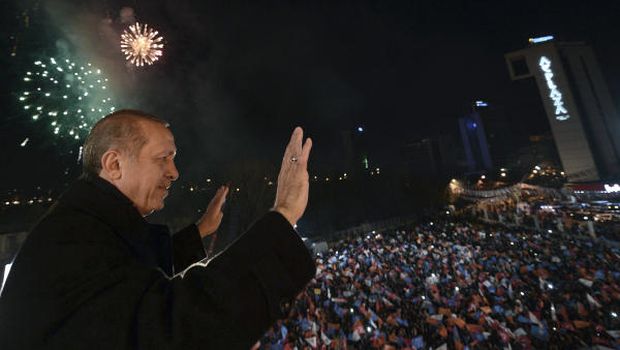
In this photo provided by the Turkish Prime Minister’s Office, Turkey’s Prime Minister Recep Tayyip Erdoğan salutes supporters from the balcony of his ruling party headquarters in Ankara, Turkey, early Monday, on March 31, 2014. (AP Photo/Kayhan Ozer, Turkish Prime Minister’s Press Office)
Prime Minister Recep Tayyip Erdoğan’s party has survived the demonstrations of millions as Turkish people took to the streets during the summer to protest his government’s increasingly authoritarian tactics. Even the corruption scandal that broke in December, resulting in the resignation of four cabinet ministers, failed to shake the party’s dominance. Leaked tapes of the prime minister’s conversations have revealed tender rigging and censorship. Turkey has attracted international condemnation after its banning of Facebook and YouTube. To top it all off the value of the Turkish lira has inevitably been weakened by the political commotion.
The result of all of this was Erdoğan making a victory speech late Sunday night, standing next to his son Bilal. The very fact that Erdoğan chose to take to the stage with his son is acutely symbolic of the prime minister’s defiance. In one of the most shocking among the leaked audio recordings, Erdoğan allegedly asks his son to hide stashes of money.
So what explains this resounding victory? It seems that the AKP’s constituency preferred to hold on to the gains that had been made under Erdoğan rather than risk losing them if the elections resulted in a serious defeat for the ruling party. Kadri Gürsel from the Turkish daily Milliyet pinpoints one these gains as the “conservative Sunni political–cultural identity” that Erdoğan offers to his constituents.
The lifting of the ban on wearing a headscarf in universities and in state institutions is an example of such a gain for those who find their identity in Sunni conservatism. According to Gürsel, “The imposition of Sunni conservative values [by the AKP] . . . supported by interference in lifestyles and bans has pleased these circles and given them a taste of power. The fact that they wanted this taste to last longer and used their vote to that end was made possible by the Islamic conservative identity offered by Erdoğan to his constituency.”
In other words, the masses that felt they had been underrepresented, ignored and even looked down on by the former Republican, Kemalist and secular elites until the 2000s thought they would lose the feeling of finally being heard by the rulers of the country. It was “identity politics,” said prominent pollster Bekir Ağırdır, that determined voters’ behavior; many in Turkey could not identify with the opposition parties.
The only thing that could have challenged these identity politics was a deterioration in the economic situation. Yet, any recent weakening of the economy was offset by the many improvements to the standard of living under the AKP, particularly for the most deprived. Turkey’s growing economy over the last decade lies at the heart of the AKP’s success. Although there has been some stagnation, it has not seriously impacted the lives of ordinary people. At the same time, the opposition parties proved unsuccessful in weakening the conviction among the AKP electorate that if the ruling party were to lose, they would lose their economic gains as well.
While analysts argue over the reasons for the AKP’s success, one thing is certain: few contest Erdoğan’s overall victory. While there have been various claims of election fraud, any irregularities would not change the final outcome. Even AKP opponents believe Erdoğan has won and opposition leaders have lost.
The results are unlikely to usher in a period of calm. Erdoğan is still seeking to have his revenge on his arch-enemy, the Gülen movement—the group Erdoğan has accused of actively seeking to discredit his government. His victory speech showed that he will continue to rule the country while ignoring the views of those who have not voted for him. While he said that his party would genuinely evaluate the message sent by those who hadn’t voted for the AKP, his track record fills opponents with little confidence. Erdoğan is likely to read election results as a renewed mandate for his authoritarian rule and this will further increase polarization and tensions in Turkey.
Forty-five percent of the vote does not mean the electorate does not care about corruption; it just tells us they are not convinced the opposition parties would do a better job. Corruption allegations will continue to haunt Erdoğan, and AKP opponents will continue to challenge him using all means available through civil society.
All views expressed in this blog post are those of the author and do not necessarily represent the views of, and should not be attributed to, Asharq Al-Awsat newspaper and The Majalla magazine.
